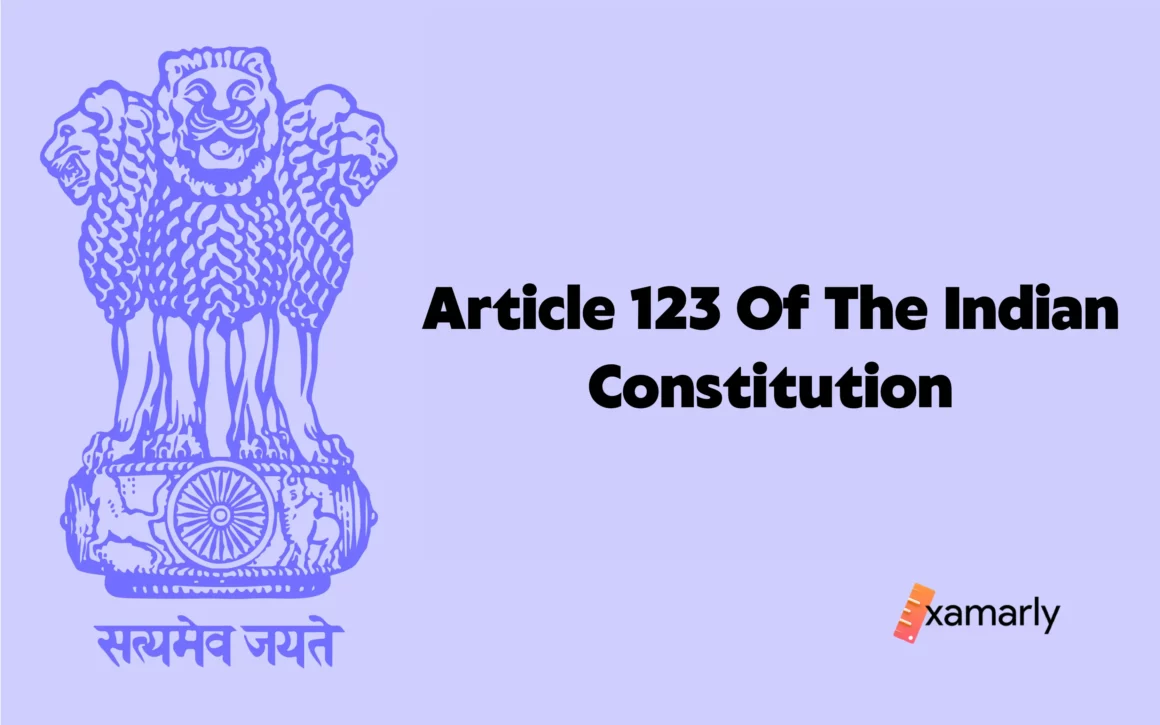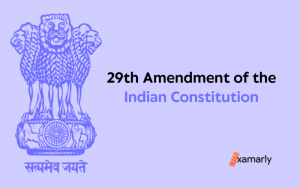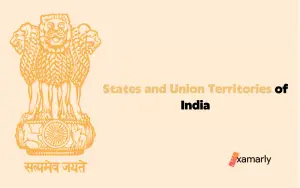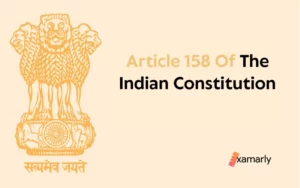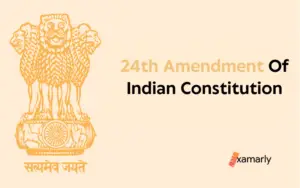An Overview
Article 123 of the Indian Constitution reflects on the power of the President on promulgating ordinances in some exclusive scenarios.
We will learn about the concepts like ordinance and its limitations, the lifecycle of an ordinance, the role of the Lok Sabha and the Rajya Sabha in the formation of an Act from an ordinance, among other important aspects.
Before delving deep into Article 123 of the Indian Constitution, we will discuss some important concepts that play a pivotal role in this Article.
- An Overview
- What Is An Ordinance?
- Limitations Of An Ordinance
- Facts About Ordinance
- Facts About The Formation of An Ordinance In India
- Article 123 Of The Indian Constitution – In Detail
- Judgements Related To The President's Authority On Ordinance
- Summing Up
- FAQs
- Who issues Ordinance?
- What is the lifespan of an Ordinance?
- Can an ordinance be issued if either of the House is working?
- Can an ordinance be issued during the adjournment of the House?
- Can an ordinance be considered a temporary provision to tackle with an emergency situation?
- Can an ordinance be issued when the Parliament is in session?
What Is An Ordinance?
An ordinance is a legislation or decree that is issued by the executive branch of a state or national government without the approval of the legislative is known as an ordinance.
Examples of this include the collection of additional taxes to increase income or the mobilization of resources in response to a danger or emergency situation.
In order for an ordinance to be properly implemented, it is necessary that it not be in contradiction with any higher laws, such as those found in the constitution, the laws of the state, or the laws of the country.
Limitations Of An Ordinance
i. In order for the President to be able to promulgate an ordinance, one of the two Houses of Parliament must be out of session.
ii. In order for the President to be able to promulgate an ordinance, he must first be convinced that there are exceptional circumstances that call for “rapid action.”
iii. Ordinances must get approval from Parliament within six weeks of the legislature being reassembled or they will no longer be in effect. In the event that motions expressing opposition to the ordinance are approved by both Houses, they will also halt all operations.
Related – Article 122 Of The Indian Constitution
Facts About Ordinance
In order to avoid becoming obsolete, an ordinance must be turned into law within the first 42 days of the next session of Parliament; otherwise, it will be considered to have been cancelled.
Only three times are allowed for an ordinance to be re-promulgated. In addition, in accordance with Article 213 of the Constitution of India, the governor of a state has the authority to promulgate ordinances even while the state legislative assembly is not in session.
The ability of the President and the Governor to make ordinances has been the subject of a number of significant and varied debates. Given the principle of separation of powers, important questions have been raised regarding the judicial review of the executive branch’s authority to make ordinances, the requirement for “immediate action” during the promulgation of an ordinance, and the granting of ordinance-making powers to the executive branch.
In nations like the United States and Britain, having separate branches of government is of utmost importance. The governments of the United States or the United Kingdom do not have the authority to pass ordinances.
Facts About The Formation of An Ordinance In India
- It is possible to backdate it.
- It is expected that the Parliament will give its approval within the next six weeks.
- The actions that are done and finished before the lapse of the ordinance remain active even after the ordinance has expired.
- This authority of the President is justifiable due to the fact that it may be exercised on either hand.
- There is absolutely no connection between this and the president’s authority to declare a state of national emergency.
- Only in unusual or exceptional situations is the ordinance subject to exception.
- This clause is absent from the legal systems of the vast majority of democratic nations.
- Any act of parliament or any other regulation may be subject to amendment or repeal at its discretion.
Article 123 Of The Indian Constitution – In Detail
We will now understand Article 123 of the Indian Constitution in detail by analyzing each and every clause in it.
Clause 1 – As it is & Explained
123. Power of President to promulgate Ordinances during recess of Parliament
(1) If at any time, except when both Houses of Parliament are in session, the President is satisfied that circumstances exist which render it necessary for him to take immediate action, he may promulgate such Ordinance as the circumstances appear to him to require
The first clause of Article 123 of the Indian Constitution says that if the President is ever convinced that circumstances exist that require him to take immediate action, he may, at any time, other than when both houses of Parliament are in session, promulgate such Ordinance as the circumstances appear to him to require.
This provision does not apply when both houses of Parliament are in session.
Clause 2 – As it is & Explained
(2) An Ordinance promulgated under this article shall have the same force and effect as an Act of Parliament, but every such Ordinance
(a) shall be laid before both House of Parliament and shall cease to operate at the expiration of six weeks from the reassemble of Parliament, or, if before the expiration of that period resolutions disapproving it are passed by both Houses, upon the passing of the second of those resolutions; and
(b) may be withdrawn at any time by the President Explanation Where the Houses of Parliament are summoned to reassemble on different dates, the period of six weeks shall be reckoned from the later of those dates for the purposes of this clause
The second clause of Article 123 says that an ordinance that has been promulgated under this article will be as effective as an Act is but there are some clauses that have to be kept in consideration. These clauses or constraints are well mentioned in the sub-clauses (a) and (b)
(a) The ordinance has to be presented in both Rajya Sabha and the Lok Sabha. The ordinance should not be operative for more than six weeks from the day the Houses started working.
If when both Houses have disapproved the ordinance before six weeks, then the ordinance should stop working as soon as it has been disapproved by both Houses.
(b) If the President feels that he needs to take back the ordinance then he can always take it back and it will nullify the ordinance.
If suppose both the Houses have started working on different dates, then the period of six weeks will start from the later date when the House that started working was later reassembled.
Clause 3 – As It is – Explained
(3) If and so far as an Ordinance under this article makes any provision which Parliament would not under this Constitution be competent to enact, it shall be void CHAPTER IV THE UNION JUDICIARY
The third clause of Article 123 of the Indian Constitution says that if the President has promulgated an ordinance that does not stand with the ethical structure as laid down in our constitution, and because of this the Parliament is unable to enact this ordinance, then it will be considered as void and will not come into effect.
Judgements Related To The President’s Authority On Ordinance
In this case, the Governor of Bihar promulgated 256 ordinances from 1967 to 1981and they all were re-promulgated from one to fourteen years. Against this, D.C. Wadhwa filed the writ.
Court held it a “subversion of the democratic process and colourable exercise of powers.”
Summing Up
In Article 123 of the Indian Constitution, we saw that the President and the Governor hold the utmost power of making law when the Houses of Parliament is not working. But, we can also see here that our constitution has been drafted in such a way that it keeps a check on every single decision taken even by the highest officials of the country.
As a matter of fact, an ordinance is indeed an important element of the government as it is a key to keeping things in check by making provisions when the official body that is responsible for making provisions is not working.
We can also conclude that being the highest official of the country is having the best decisive power because one has to take decisions for the population of a nation.
Our constitution is a framework that should be considered while taking the most crucial decisions.
Article 123 of the Indian Constitution is one of the significant Articles presented in the constitution as it lays down the fundamentals regarding an ordinance. It also reflects upon the powers of the President and the powers of the Houses of Parliament.
All in all, Article 123 of the Indian Constitution is one rich Article that holds a lot of important facts about the government.
FAQs
Who issues Ordinance?
The President of India issues Ordinance.
What is the lifespan of an Ordinance?
An Ordinance has a lifespan of 42 days or six weeks from the date of reassembling of the Lok Sabha and the Rajya Sabha.
Can an ordinance be issued if either of the House is working?
Yes, the ordinance can be issued even if either of the Houses is working.
Can an ordinance be issued during the adjournment of the House?
No, an ordinance cannot be issued if the Houses are adjourned.
Can an ordinance be considered a temporary provision to tackle with an emergency situation?
Yes, an ordinance can be considered a temporary provision to tackle an emergency situation.
Can an ordinance be issued when the Parliament is in session?
No, an ordinance cannot be issued when the Parliament is in session.


